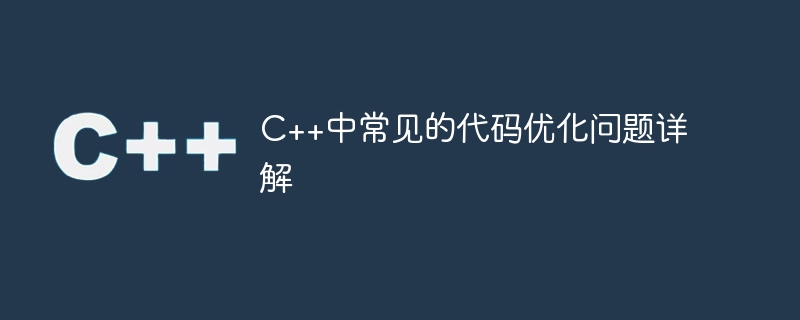

Detailed explanation of common code optimization problems in C
Introduction:
With the continuous development of computer technology, improving the performance of code has become the top priority of programmers One of the tasks. For C, a high-level programming language, code optimization is a very important part. This article will introduce in detail common code optimization issues in C and give specific code examples.
1. Avoid frequent function calls:
C The process of function calling will involve operations such as the creation and destruction of function stacks. Frequent function calls will cause certain performance losses. Therefore, where frequent execution is required, you can consider merging multiple functions into one function, thereby reducing the number of function calls and improving code performance. For example, the following code shows an incorrect example:
int add(int a, int b) {
return a + b;
}
int multiply(int a, int b) {
return a * b;
}
int main() {
int num1 = 1;
int num2 = 2;
int num3 = 3;
int result = multiply(add(num1, num2), num3);
cout << result << endl;
return 0;
}In the above example, the function calls are too nested and the add() function is called twice. In fact, we can use these two functions Merge into one function to reduce the number of function calls:
int addAndMultiply(int a, int b, int c) {
return (a + b) * c;
}
int main() {
int num1 = 1;
int num2 = 2;
int num3 = 3;
int result = addAndMultiply(num1, num2, num3);
cout << result << endl;
return 0;
}By merging multiple functions into one function, you can reduce the number of function calls and improve the performance of the code.
2. Optimization in loops:
Loop is one of the most commonly used statements in C, so the performance of the loop has a great impact on the performance of the entire program. The following are some common methods for optimizing loops:
Reduce unnecessary loop variable calculations:
The calculation of loop variables also takes a certain amount of time, so it should be minimized in the loop. Unnecessary calculations. For example, the following code shows a comparison before and after optimization:
// 优化前
for (int i = 0; i < array.size(); i++) {
// 循环体
}
// 优化后
int size = array.size();
for (int i = 0; i < size; i++) {
// 循环体
}In the above example, we can see that in the loop condition judgment, the array.size() function must be called in each loop, but in fact The size of the above array will not change, so we can store it in a local variable first to reduce unnecessary calculations.
Avoid memory access conflicts:
Memory access in loops may cause cache misses and other problems, resulting in reduced program performance. In order to avoid this situation, we can try to make memory access continuous. For example, the following code shows a comparison before and after optimization:
// 优化前
int sum = 0;
for (int i = 0; i < array.size(); i++) {
sum += array[i];
}
// 优化后
int sum = 0;
int size = array.size();
for (int i = 0; i < size; i++) {
sum += array[i];
}In the above example, we store the calculation result of array.size() in a local variable, and try to avoid the array when iterating through the loop. Non-contiguous access to elements, thereby improving the performance of your code.
3. Use appropriate data structures:
Choosing appropriate data structures is also an important part of optimizing code. Different data structures show different performance in different scenarios. The following are some common optimization tips:
Use a hash table instead of linear search:
When you need to find an element frequently, using a hash table can improve the efficiency of the search. For example, the following code shows a comparison before and after optimization:
// 优化前
int target = 10;
bool found = false;
for (int i = 0; i < array.size(); i++) {
if (array[i] == target) {
found = true;
break;
}
}
// 优化后
int target = 10;
unordered_set<int> hashSet(array.begin(), array.end());
bool found = (hashSet.find(target) != hashSet.end());In the above example, we changed the linear search to a hash table search, thus improving the efficiency of the search.
Use vectors instead of linked lists:
When frequent insertion and deletion operations are performed on the container, using vectors will have better performance than linked lists. For example, the following is a comparison before and after optimization:
// 优化前
list<int> dataList;
for (int i = 0; i < n; i++) {
dataList.push_back(i);
}
// 优化后
vector<int> dataVec;
dataVec.reserve(n);
for (int i = 0; i < n; i++) {
dataVec.push_back(i);
}In the above example, we changed the linked list to a vector, and used the reserve() function to reserve enough space, thus improving the efficiency of insertion.
Conclusion:
The performance of C code can be significantly improved by reasonably avoiding frequent function calls, optimizing loops, and selecting appropriate data structures. However, optimizing code is a complex task that requires specific analysis and optimization based on specific application scenarios. I hope this article can inspire readers in C code optimization and help in practical work.
The above is the detailed content of Detailed explanation of common code optimization problems in C++. For more information, please follow other related articles on the PHP Chinese website!
 what is optimization
what is optimization
 Baidu keyword optimization software
Baidu keyword optimization software
 Baidu SEO keyword ranking optimization method
Baidu SEO keyword ranking optimization method
 Introduction to the usage of vbs whole code
Introduction to the usage of vbs whole code
 What are the differences between c++ and c language
What are the differences between c++ and c language
 Recommended learning order for c++ and python
Recommended learning order for c++ and python
 Cost-effectiveness analysis of learning python and c++
Cost-effectiveness analysis of learning python and c++
 Is c language the same as c++?
Is c language the same as c++?




